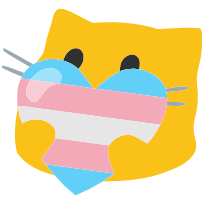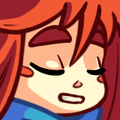For today's book review, I'm going to tell you about a graphic novel (serialized manga?) called "Until I Love Myself" by Poppy Pesuyama.
CW: mentions of SA
Pesuyama is an AFAB trans non-binary mangaka from Japan. "Until I Love Myself" is an autobiographical work that covers their life from childhood and the struggles they had with gender dysphoria and sexual assault.
Pesuyama describes their manga as essays. Formalisticaly, this means that the manga is primarily expository, dialogue is heavy, and the art (while cute) is fairly sparse and basic. Originally, I think I was put off by this approach, and I didn't find myself relating to Pesuyama's experiences like I have with previous queer literature. However, now that I have finished it and sat with my feelings for a while, I think that this manga is going to stay with me for a very long time, and I find that it resonates with me more by the hour. (Even more than Sara Soler's "Us" which I thought was literally me fr fr).
In the following section, I'm going to discuss the themes and poignant messages of the manga, but I won't include spoilers. The manga deals heavily with multiple instances of sexual assault; however, while I will mention it, I won't provide any details.
discussion, SA
Perhaps the most powerful idea in Pesuyama's work is that of forgiveness. Throughout the manga, they ask, "Can I forgive my female body?" The fact that Pesuyama has a female body informs the narrative, as they endure instances of sexism and sexual assault throughout their life. Beyond dysphoria, these experiences push Pesuyama to loath themself, blaming their female body for all of the things that happened to them.
I can't help but think of the common trans experience of hating an assigned gender and how so often transition is so focused on hating an assigned gender rather than loving a preferred one.
To me, Pesuyama's forgiveness of their body is a powerful example for all trans people. They recognize their transness, they don't accept their assigned gender, they would prefer another body; however, they forgive their body for being what it is before (maybe) moving forward with medical transition (Pesuyama ends the manga by contemplating whether or not to start HRT).
Growing from Pesuyama's forgiveness, the next theme moves outward and is concerned with the confrontation of the self with a hostile culture. Upon acknowledging that their "female body is not at fault" for what happened to them, Pesuyama must confront the society that allowed their sexual assault and marginalization to be normalized. They argue that evil is rather banal and that abusers are, for all intents and purposes, "normal" people who are allowed (and taught and incentivized) to act in particular ways.
The original assault is amplified by a hostile culture, as people online diminish, deny, or criticize the fact that Pesuyama is speaking out. The term used to describe this is "second rape."
After staying quiet for 7 years, Pesuyama decides to pursue retribution against her abuser. When speaking with a lawyer, the lawyer mentions that the case probably would have been thrown out 7 years prior, but in the modern day, they had a solid chance to win. This leads Pesuyama to reflect on the importance of cultural progress, the people who fight for it, and the MeToo movement in particular. Pesuyama concludes that these changes are inherently political (rather than individual), and that people need to be protected legally, not just culturally as the dominant liberal ideology would imply.
Finally, one very interesting aspect of the manga is the differing perceptions of trauma and abuse. Pesuyama confronts their abuser and receives his side of the story. It's interesting to see how Pesuyama imagined their abuser's thoughts, how the abuser interpreted his own actions, and how Pesuyama argued against the abuser's justifications.
Pesuyama also talks with a friend who was sexually assaulted often but seems unphased by it. This leads Pesuyama to doubt themselves, thinking that they are simply weak. Eventually, they stop comparing themself to others and tries to move on with healing at their own pace.
There's also an interesting throughline of using art as a method of healing along with the particular details of Pesuyama's therapy, but I won't go into those here.
my personal experience with the manga
This manga had a large impact on me, from confronting the sexual assault experienced in my own life to the acceptance of my body as it is.
While I experience dysphoria with my body, I also found myself hallucinating dysphoria where it wasn't because I felt like I was "supposed to" in order to validate my experience with gender. I largely have mixed feelings about my body. Pesuyama talks about their experience with make-up and how they loved watching make-up tutorials because looking feminine was always just so much easier than looking masculine. However, they decided to stop because, despite looking good in a traditional sense and enjoying the process, it kept them from presenting the way they actually wanted to. I largely feel the same way about my facial hair. I always had trouble with the idea that when I look at myself in the mirror with a beard, that I think I look good. "How could I be trans if I feel this way?" It's just so much easier for me to look masculine. I literally have to do nothing, and I can be a handsome man. But... It keeps me from presenting the way I really want to present in the world.
So... I forgive my body and all my weirdness. It's not my fault I was born the way I was, and there's nothing wrong with me. I will continue to change my body, not out of disgust but love.
.
I want to end with a quote that Pesuyama ends their manga with by Yukio Mishima:
"I can no longer sit in silence watching other people's intoxicated joy. I can no longer be satisfied with the tragic resignation of being separate from it."
Damn, ty for sharing your personal thoughts as well regarding this one. This entire post is heavy as fuck, it's affecting.
I had already put this on my TBR when you mentioned it, 'cause A) it's unique and fascinating B) I really liked the similarly autobiographical Nagata Kabi manga. I def have to read this now, although Idk when I will because I'm not in the right headspace to hunker down for that much heavy subject matter. Sometime, though.
I love when there is textually queer manga, and the autobiographical type is a specific smell I think I dig
Damn, ty for sharing your personal thoughts as well regarding this one. This entire post is heavy as fuck, it's affecting
Yeah, I'm pretty shaken up tbh, but I'm good
Oh, I saw Kabi's work recommended to me, and I like the art. I'm not sure what I'll read next, and I'm not sure I wanna gear up for something so heavy again so soon
Yeah the, uh what do they call them collectively? My Lesbian Experience With Loneliness,Solo Exchange Diary Vol 1 and 2, My Alcoholic Escape From Reality,My Wandering Warrior Existence... oh shit and there are two more now. Anyway yeah I would wager you'd like em if you like this, same vibe, the Kabi manga is similarly heavy subject matter but maybe a bit less harrowing?
Also if you read something cool, whatever it may be, I am curious ✨
Also if you read something cool, whatever it may be, I am curious ✨
Thanks, it's nice to have people to read with and talk.
I can't believe how much I've shifted over time. 5 years ago, 3 years ago... Maybe even 1 year ago? I would have found reading like this so boring. Sometimes I'll even be halfway through a story and think, "why are you even reading this? You're trying too hard to convince yourself you're queer."
And then I finish it, and I'm like "oh my god, this was a formative experience." To actually feel something from reading, even negative feelings, is pretty incredible. And I'm feeling these things from people simply sharing their life experiences.
Congrats on convincing yourself that you are queer!!! I actually sort of relate to this though? I wasn't much into reading prior to transition and even the queer books I read before I came out didn't do much for me, Nevada's talons aside. I kind of read for emotional catharsis now though, if I come away from a queer story not feeling anything, something fucked up. It is nice.
For today's book review, I'm going to tell you about a graphic novel (serialized manga?) called "Until I Love Myself" by Poppy Pesuyama.
CW: mentions of SA
Pesuyama is an AFAB trans non-binary mangaka from Japan. "Until I Love Myself" is an autobiographical work that covers their life from childhood and the struggles they had with gender dysphoria and sexual assault.
Pesuyama describes their manga as essays. Formalisticaly, this means that the manga is primarily expository, dialogue is heavy, and the art (while cute) is fairly sparse and basic. Originally, I think I was put off by this approach, and I didn't find myself relating to Pesuyama's experiences like I have with previous queer literature. However, now that I have finished it and sat with my feelings for a while, I think that this manga is going to stay with me for a very long time, and I find that it resonates with me more by the hour. (Even more than Sara Soler's "Us" which I thought was literally me fr fr).
In the following section, I'm going to discuss the themes and poignant messages of the manga, but I won't include spoilers. The manga deals heavily with multiple instances of sexual assault; however, while I will mention it, I won't provide any details.
discussion, SA
Perhaps the most powerful idea in Pesuyama's work is that of forgiveness. Throughout the manga, they ask, "Can I forgive my female body?" The fact that Pesuyama has a female body informs the narrative, as they endure instances of sexism and sexual assault throughout their life. Beyond dysphoria, these experiences push Pesuyama to loath themself, blaming their female body for all of the things that happened to them.
I can't help but think of the common trans experience of hating an assigned gender and how so often transition is so focused on hating an assigned gender rather than loving a preferred one.
To me, Pesuyama's forgiveness of their body is a powerful example for all trans people. They recognize their transness, they don't accept their assigned gender, they would prefer another body; however, they forgive their body for being what it is before (maybe) moving forward with medical transition (Pesuyama ends the manga by contemplating whether or not to start HRT).
Growing from Pesuyama's forgiveness, the next theme moves outward and is concerned with the confrontation of the self with a hostile culture. Upon acknowledging that their "female body is not at fault" for what happened to them, Pesuyama must confront the society that allowed their sexual assault and marginalization to be normalized. They argue that evil is rather banal and that abusers are, for all intents and purposes, "normal" people who are allowed (and taught and incentivized) to act in particular ways.
The original assault is amplified by a hostile culture, as people online diminish, deny, or criticize the fact that Pesuyama is speaking out. The term used to describe this is "second rape."
After staying quiet for 7 years, Pesuyama decides to pursue retribution against her abuser. When speaking with a lawyer, the lawyer mentions that the case probably would have been thrown out 7 years prior, but in the modern day, they had a solid chance to win. This leads Pesuyama to reflect on the importance of cultural progress, the people who fight for it, and the MeToo movement in particular. Pesuyama concludes that these changes are inherently political (rather than individual), and that people need to be protected legally, not just culturally as the dominant liberal ideology would imply.
Finally, one very interesting aspect of the manga is the differing perceptions of trauma and abuse. Pesuyama confronts their abuser and receives his side of the story. It's interesting to see how Pesuyama imagined their abuser's thoughts, how the abuser interpreted his own actions, and how Pesuyama argued against the abuser's justifications.
Pesuyama also talks with a friend who was sexually assaulted often but seems unphased by it. This leads Pesuyama to doubt themselves, thinking that they are simply weak. Eventually, they stop comparing themself to others and tries to move on with healing at their own pace.
There's also an interesting throughline of using art as a method of healing along with the particular details of Pesuyama's therapy, but I won't go into those here.
my personal experience with the manga
This manga had a large impact on me, from confronting the sexual assault experienced in my own life to the acceptance of my body as it is.
While I experience dysphoria with my body, I also found myself hallucinating dysphoria where it wasn't because I felt like I was "supposed to" in order to validate my experience with gender. I largely have mixed feelings about my body. Pesuyama talks about their experience with make-up and how they loved watching make-up tutorials because looking feminine was always just so much easier than looking masculine. However, they decided to stop because, despite looking good in a traditional sense and enjoying the process, it kept them from presenting the way they actually wanted to. I largely feel the same way about my facial hair. I always had trouble with the idea that when I look at myself in the mirror with a beard, that I think I look good. "How could I be trans if I feel this way?" It's just so much easier for me to look masculine. I literally have to do nothing, and I can be a handsome man. But... It keeps me from presenting the way I really want to present in the world.
So... I forgive my body and all my weirdness. It's not my fault I was born the way I was, and there's nothing wrong with me. I will continue to change my body, not out of disgust but love.
.
I want to end with a quote that Pesuyama ends their manga with by Yukio Mishima:
"I can no longer sit in silence watching other people's intoxicated joy. I can no longer be satisfied with the tragic resignation of being separate from it."
Damn, ty for sharing your personal thoughts as well regarding this one. This entire post is heavy as fuck, it's affecting.
I had already put this on my TBR when you mentioned it, 'cause A) it's unique and fascinating B) I really liked the similarly autobiographical Nagata Kabi manga. I def have to read this now, although Idk when I will because I'm not in the right headspace to hunker down for that much heavy subject matter. Sometime, though.
I love when there is textually queer manga, and the autobiographical type is a specific smell I think I dig
Yeah, I'm pretty shaken up tbh, but I'm good
Oh, I saw Kabi's work recommended to me, and I like the art. I'm not sure what I'll read next, and I'm not sure I wanna gear up for something so heavy again so soon
Yeah the, uh what do they call them collectively? My Lesbian Experience With Loneliness, Solo Exchange Diary Vol 1 and 2, My Alcoholic Escape From Reality, My Wandering Warrior Existence... oh shit and there are two more now. Anyway yeah I would wager you'd like em if you like this, same vibe, the Kabi manga is similarly heavy subject matter but maybe a bit less harrowing?
Also if you read something cool, whatever it may be, I am curious ✨
Thanks, it's nice to have people to read with and talk.
I can't believe how much I've shifted over time. 5 years ago, 3 years ago... Maybe even 1 year ago? I would have found reading like this so boring. Sometimes I'll even be halfway through a story and think, "why are you even reading this? You're trying too hard to convince yourself you're queer."
And then I finish it, and I'm like "oh my god, this was a formative experience." To actually feel something from reading, even negative feelings, is pretty incredible. And I'm feeling these things from people simply sharing their life experiences.
It's been nice
Ofc, and I feel the same ✨
Congrats on convincing yourself that you are queer!!! I actually sort of relate to this though? I wasn't much into reading prior to transition and even the queer books I read before I came out didn't do much for me, Nevada's talons aside. I kind of read for emotional catharsis now though, if I come away from a queer story not feeling anything, something fucked up. It is nice.
I would like to clarify that I didn't actually need convincing. I needed understanding and acceptance
The first half of volume 1 was soul crushing. I've yet to read volume 2, but what I've seen thus far is great.
Vol 1 is soul crushing
Vol 2 is soul reconstructing
I recommend you don't leave that story hanging in your mind!
@ashinadash@hexbear.net here it is!
@Cromalin@hexbear.net idk you're interested in queer manga